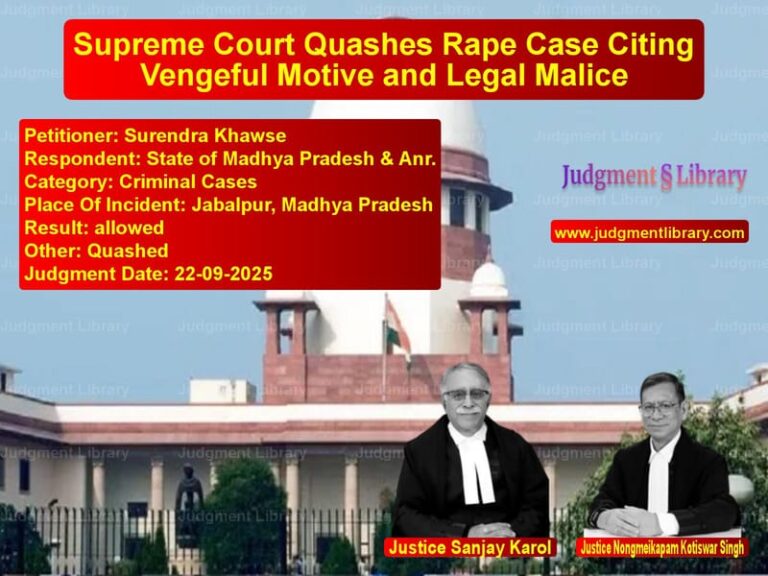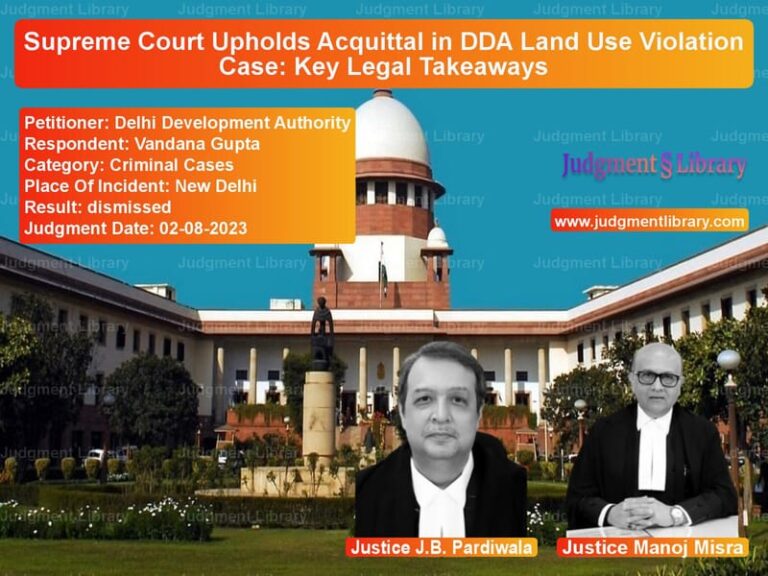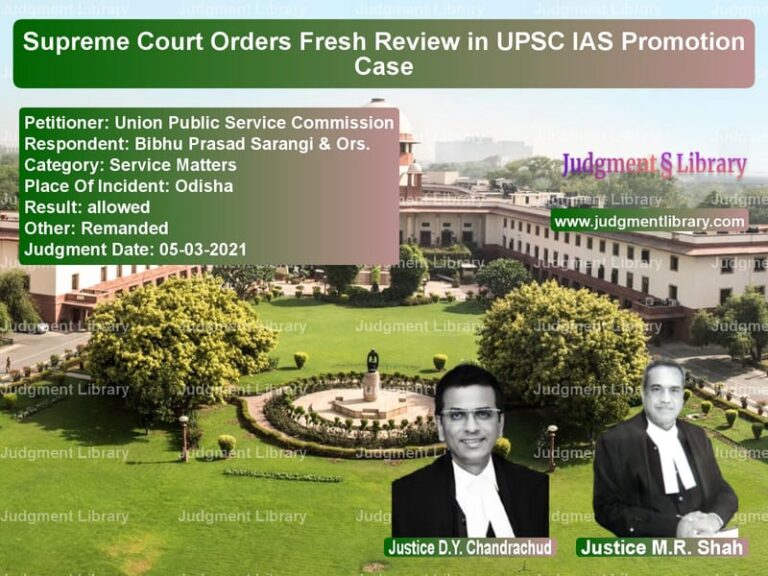SEBI’s Crackdown on Synchronized Trading: Supreme Court Upholds Market Integrity
The stock market in India operates on the principles of fairness, transparency, and integrity. The Securities and Exchange Board of India (SEBI) plays the crucial role of a vigilant watchdog to ensure these principles are upheld. In this landmark case, SEBI brought action against several traders and brokers, including Rakhi Trading Private Ltd., alleging violations of the SEBI (Prohibition of Fraudulent and Unfair Trade Practices Relating to Securities Market) Regulations, 2003 (PFUTP Regulations). The case revolves around synchronized and reverse trades that were alleged to manipulate the securities market, a practice that SEBI sought to curtail.
Background of the Case
SEBI alleged that traders, including Rakhi Trading Private Ltd., executed synchronized trades that gave misleading appearances of genuine market transactions. These transactions took place in the derivatives segment of the stock market, specifically in NIFTY options. SEBI argued that the reversal trades were entered into with a prior understanding between parties, thereby violating Regulations 3 and 4 of the PFUTP Regulations.
The traders executed buy and sell orders in close succession, sometimes within seconds of each other, without any real intention of genuine trading. The Securities Appellate Tribunal (SAT), however, overturned SEBI’s findings, ruling that these transactions had no impact on the overall market and were not manipulative. SEBI subsequently appealed the decision before the Supreme Court.
Petitioner’s Arguments (SEBI)
SEBI argued that these transactions were non-genuine and orchestrated, violating fair trading principles. It contended:
- The transactions were reversed within seconds or minutes without any significant price movement in the underlying security, indicating that they were not based on market forces.
- The trades misused the stock exchange platform, which should only facilitate genuine price discovery and fair trading.
- Manipulated and synchronized trades harm market integrity and exclude other genuine investors.
- The market was used for a non-genuine trade to book artificial profits or losses.
SEBI cited the PFUTP Regulations, which prohibit fraudulent and manipulative practices. It argued that the trades created artificial volumes and deprived other investors of fair market participation.
Respondent’s Arguments (Rakhi Trading Private Ltd.)
The respondents argued that:
- The trades were executed on the screen-based system of the stock exchange, which ensured anonymity. Hence, there was no prior understanding between the parties.
- The trades were a part of normal market activity and did not influence the stock market adversely.
- Futures and Options (F&O) trading operates differently from the cash segment, and synchronized trades do not necessarily indicate manipulation.
- There was no proof that the trades had an adverse impact on market integrity.
They also contended that synchronized trades, by themselves, are not illegal unless proven to be fraudulent or manipulative.
Supreme Court’s Decision
The Supreme Court overturned SAT’s ruling and upheld SEBI’s findings. The Court made several significant observations:
- SEBI’s role as a market regulator is to prevent manipulative trading and ensure that the stock market remains fair and transparent.
- Even in the derivatives market, synchronized and reversal trades can indicate manipulation if they consistently result in profit for one party and loss for the other.
- The concept of “change of beneficial ownership” applies to derivatives as well. Reversal trades that restore the ownership to the original party defeat the purpose of genuine trading.
- The stock exchange is meant for fair price discovery, and manipulated trades compromise market integrity.
- Market manipulation does not necessarily require large-scale impact; even orchestrated trades that deceive investors violate the PFUTP Regulations.
The Supreme Court emphasized that synchronized trades that do not reflect genuine market sentiment amount to fraud and unfair trade practices under the SEBI Act. The Court reinstated SEBI’s penalties on traders while exonerating the brokers, as there was insufficient evidence of their involvement in the manipulation.
Key Takeaways from the Judgment
The Supreme Court’s ruling establishes the following legal principles:
- Market Integrity: Synchronized and reversal trades that create misleading appearances of market activity are fraudulent.
- Fair Trading Practices: Stock exchanges are platforms for fair price discovery, and trades should not be structured to manipulate the market.
- Role of SEBI: SEBI has the authority to intervene in cases of market manipulation to protect investor confidence and the integrity of the securities market.
- Impact of Manipulation: Even if the broader market is not affected, manipulation at the level of individual traders is still a violation.
Conclusion
The Supreme Court’s judgment is a landmark ruling reinforcing SEBI’s powers to curb manipulative trading practices. The ruling sends a strong message that the Indian stock market cannot be misused for artificial price creation and fraudulent practices. By upholding SEBI’s authority, the Court has strengthened investor confidence and emphasized the need for market integrity and transparency.
Petitioner Name: Securities and Exchange Board of IndiaRespondent Name: Rakhi Trading Private Ltd.Judgment By: Justice Kurian Joseph, Justice R. BanumathiJudgment Date: 07-02-2018
Don’t miss out on the full details! Download the complete judgment in PDF format below and gain valuable insights instantly!
Download Judgment: Securities and Excha vs Rakhi Trading Privat Supreme Court of India Judgment Dated 07-02-2018.pdf
Direct Downlaod Judgment: Direct downlaod this Judgment
See all petitions in Corporate Governance
See all petitions in unfair trade practices
See all petitions in Company Law
See all petitions in Judgment by Kurian Joseph
See all petitions in Judgment by R. Banumathi
See all petitions in allowed
See all petitions in supreme court of India judgments February 2018
See all petitions in 2018 judgments
See all posts in Corporate and Commercial Cases Category
See all allowed petitions in Corporate and Commercial Cases Category
See all Dismissed petitions in Corporate and Commercial Cases Category
See all partially allowed petitions in Corporate and Commercial Cases Category







